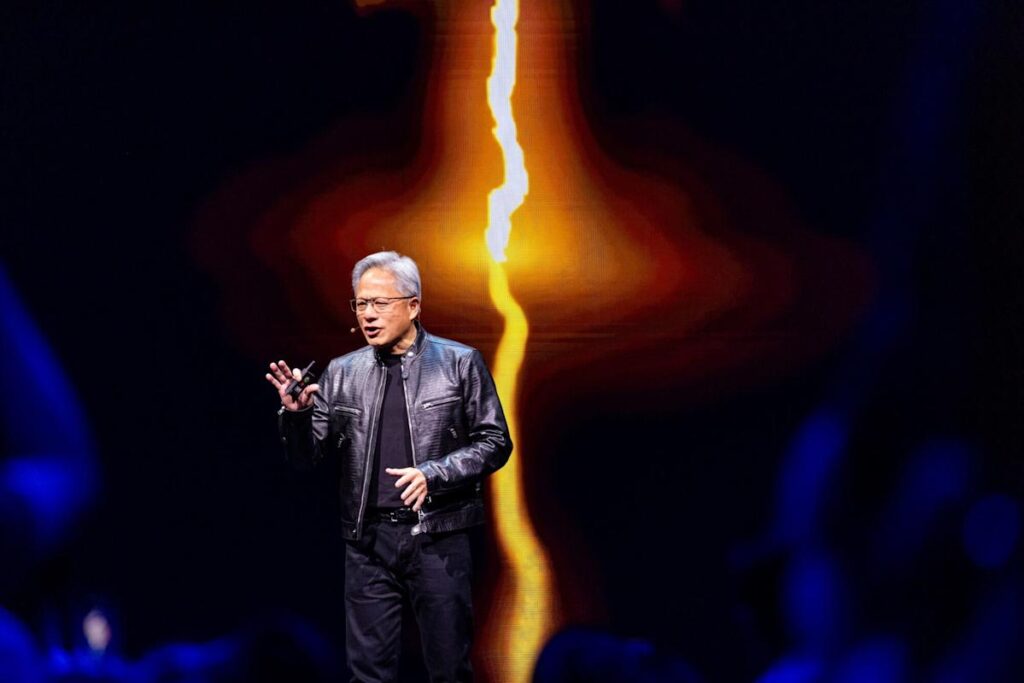(Bloomberg) — Jensen Huang, CEO of Nvidia Corp., is set to headline the 2025 edition of Asia’s largest electronics conference, Computex. While his company has long been a frontrunner for advanced AI chips, this year, the spotlight may shift to a more prominent figure: US President Donald Trump.
Awaiting Computex 2025: Insights and Industry Leaders
Kicking off on Monday in Taipei, Computex will once again gather industry luminaries, including Huang, Qualcomm’s Cristiano Amon, and Young Liu from Foxconn. Last year celebrated the surging AI landscape post-ChatGPT; however, this year’s discussions are likely to delve into the uncertainties caused by the Trump administration’s initiatives to reshape the global tech manufacturing scenario.
Key Hardware for Artificial Intelligence
The exhibition will showcase essential AI hardware, featuring Nvidia’s latest chips, server racks from Hon Hai Precision Industry Co. (Foxconn), power components from Delta Electronics Inc., and datacenter cooling solutions from Asia Vital Components Co. However, as these corporations unveil new products, they will also face pressing questions regarding the impact of the US administration’s tariff policies.
Trump’s Vision for Domestic Manufacturing
President Trump is committed to bolstering manufacturing in the US. The White House has secured major commitments from chipmakers, including an impressive $100 billion investment from Taiwan Semiconductor Manufacturing Co. (TSMC). This new initiative will see TSMC expand its operations in Arizona, encouraging supply chain participants to propel their investments in the US amidst shifting tariff regulations.
New Opportunities in the Middle East
Recently, a US delegation led by President Trump, which included tech giants such as Jensen Huang, Elon Musk, and OpenAI co-founder Sam Altman, visited Saudi Arabia. They heralded significant new trade deals and emphasized the Middle East’s rising importance in the AI landscape. A shift in AI chip export regulations could further deepen these ties.
Challenges and Opportunities in the AI Market
Despite significant advancements in generative AI, consumer responses have lagged. Reports indicate that smartphone shipments grew by only 2.4%, and PC sales saw a modest 1.8% increase during the holiday quarter. The expectations set by companies like Samsung Electronics regarding the transformative power of AI have not yet materialized, raising questions at Computex regarding when these anticipated benefits will arrive.
Intel’s Strategic Restructuring
While Lip-Bu Tan, the new CEO of Intel Corp., will not conduct a formal keynote at Computex, he is expected to engage extensively with partners and clients. Faced with a challenging market, Tan aims to reassure previous customers of TSMC that Intel can be a reliable partner amidst ongoing transformations within the company.
Foxconn’s Rising Role in AI
Foxconn is making a notable presence at this year’s event, with Chairman Liu set to give a keynote presentation highlighting its evolving role in AI server assembly. As Foxconn seeks diversification from traditional consumer electronics, it is venturing into automotive and robotics, aiming to capitalize on the synergies between AI and these sectors.
Conclusion: A Future Driven by AI Innovations
Jensen Huang continues to be a pivotal figure in the tech landscape, with Nvidia planning upgrades to its AI chips on a yearly basis. Discussions during Computex are poised to explore collaborations and new innovations that could reshape industries. The potential for Nvidia’s partnership with MediaTek exemplifies the positive momentum toward a more AI-capable technological ecosystem.
Highlights from Asia’s Premier Electronics Conference
The 2025 edition of Asia’s largest electronics conference is set to showcase the cutting-edge technologies and products that define modern industries. This year, industry leaders from major technology firms will gather to discuss the future of electronics, artificial intelligence (AI), and the evolving global trade environment.
Keynote Speakers and Industry Visionaries
Among the notable figures attending this year are Jensen Huang from Nvidia, Cristiano Amon from Qualcomm, and Young Liu from Foxconn. The conference will serve as a platform to highlight new developments in AI and semiconductor technologies, although the backdrop of shifting global dynamics may obscure this year’s celebratory tone.
Challenges in Global Trade
This year’s event arrives during a crucial period of uncertainty in global trade policy. The ongoing efforts to reshape trade agreements, particularly in semiconductor manufacturing, suggest that the industry faces significant challenges ahead. The commitment from firms like Taiwan Semiconductor Manufacturing Company to invest in local operations reflects a strategic pivot toward self-sufficiency in chip production.
The Role of AI in Future Technologies
As the conference unfolds, a key focus will be the hardware powering advancements in AI. Expect to see an array of products, including server systems designed for AI applications and innovative cooling technologies to enhance data center efficiency. Companies will also address the implications of new regulations on exporting AI technologies, which present both challenges and opportunities.
Exploring New Markets
The Middle East is emerging as a significant new market for tech companies. Recent trade discussions have emphasized the potential for growth in this region, further highlighting the global nature of the tech industry. As countries like Saudi Arabia seek to strengthen their tech capabilities, partnerships with established firms could be mutually beneficial.
AI’s Impact on Consumer Electronics
Despite significant investments in AI, consumer enthusiasm has not matched expectations. Recent statistics show modest growth in smartphone and PC shipments, raising questions about the practical impacts of AI on daily life. Executives at the conference are likely to face inquiries surrounding the timelines for tangible advancements in consumer technology driven by AI.
Strategic Partnerships Moving Forward
Amid ongoing adjustments in the industry landscape, company leaders will be evaluating potential partnerships to navigate the evolving market. Notably, the collaboration between Intel’s new leadership and strategic partners could provide a pathway for recovery amidst competition from Nvidia and TSMC.
Conclusion
As Asia’s premier electronics conference progresses, it will serve as a vital platform for innovation and discussion. The intersection of technology, trade, and market dynamics will shape the future of the electronics industry in the years to come.


